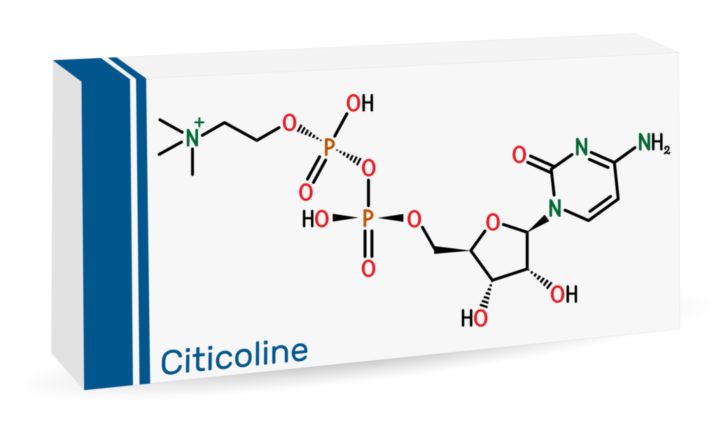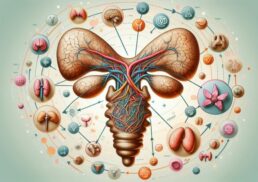Imagine a single supplement that could potentially enhance cognitive function, aid in stroke recovery, and even provide support for traumatic brain injury treatment. Enter citicoline, a naturally occurring compound that has captured the attention of researchers and healthcare professionals alike. This novel nutrient has shown promise in a wide range of applications, from improving learning and memory retention to supporting brain health in cases of cerebral ischemia. In this blog post, we will explore the fascinating world of citicoline, delving into its various uses, understanding its mechanisms of action, and uncovering its potential benefits and safety concerns.
Table of Contents
Key Takeaways
Citicoline is a naturally-occurring brain chemical with potential therapeutic benefits for neurological conditions.
Common side effects of citicoline include gastrointestinal disturbances, headaches, hypotension, tachycardia and restlessness. These are Mild.
Citicoline has been found to improve cognitive function in humans and animals as well as offer support in stroke recovery, traumatic brain injury treatment and mental health disorders such as depression & schizophrenia.
Understanding Citicoline

Citicoline, also known as cytidine diphosphate choline or CDP choline, was originally formulated in Japan for the management of acute cerebrovascular disorders and is now extensively accessible worldwide as a supplement. Citicoline is a compound found in cell membranes which has an array of important physiological functions. These include strengthening cell membrane structures and communication, supporting the creation of acetylcholine, and providing ‘betaine’ – a methyl donor molecules. This makes it potentially beneficial for chronic cerebral disorders, with research suggesting that citicoline supplementation is becoming increasingly popular.
Let’s get a more comprehensive understanding of citicoline by examining its nature, mechanism of action, and natural sources.
What is Citicoline
Citicoline is a naturally occurring brain chemical that has shown potential in the management of various neurological conditions, including vascular dementia. It functions as a precursor to the neurotransmitter acetylcholine and is employed to increase choline stores, heighten neurotransmitter availability, and bolster brain health.
In addition to its role in promoting learning capacity and memory functioning, citicoline may also be beneficial in the treatment of acute ischaemic stroke, as well as acute ischemic stroke, and potentially even acute stroke. It has been proposed that citicoline may act by accelerating the resynthesis of phospholipids and providing protection to cell membranes, potentially aiding in the treatment of mild vascular cognitive impairment.
Citicoline is approved as a drug for the treatment of neurological disorders in many countries. It is also available as a dietary supplement in the US.
How Citicoline Works
So, what is the exact mechanism behind citicoline’s effectiveness? The answer lies in citicoline’s several mechanisms of action. These include:
Increasing choline stores
Decreasing glutamate levels
Augmenting adenosine triphosphate
Enhancing glucose metabolism and cerebral blood flow
Improving the availability of neurotransmitters
These mechanisms collectively contribute to citicoline’s potential benefits on neurological function.
Research on citicoline’s impact on brain health in cerebral ischemia has shown promising results. Citicoline can support brain health by promoting the resynthesis of phospholipids, thereby safeguarding neurons, and suppressing the breakdown of cell membranes to toxic free radicals and free fatty acids. Experiments conducted on rats with induced cerebral insufficiency and models of hypoxia showed positive results when citicoline was administered. This is a testament to its potential in supporting cognitive functions.
Essentially, citicoline is crucial in promoting learning and memory abilities, and it may also be beneficial for ischemic brain injuries and cognitive impairments.
Natural Sources of Citicoline
Citicoline is naturally produced endogenously and can be found in animal and plant cell membranes. Phosphatidylcholine is produced as an intermediate from choline. This intermediate is then hydrolyzed in the small intestine, resulting in the release of both choline and cytidine for further biosynthesis.
Commercially, citicoline is available in two forms – free-base and its sodium salt. Both variants deliver the same health benefits. This accessibility allows for the potential benefits of citicoline to be harnessed through supplementation, as seen in the increasing popularity of citicoline supplements.
Potential Health Benefits
Having gained a deeper insight into citicoline, it’s time to explore the potential health benefits associated with its use. These benefits include cognitive function enhancement, stroke recovery support, and traumatic brain injury treatment.
Each of these areas has been the subject of numerous clinical trials and research efforts, shedding light on the promising potential of citicoline in various aspects of neurological health.
For more info, visit Citicoline: Potential Uses, Benefits, and Precautions.
Cognitive Function Enhancement
Citicoline has been shown to improve learning and memory retention in humans and animals alike. Citicoline is known for its memory boosting effects. A study conducted on mice demonstrated that a single oral dose administered before training improved their performance on the step-through task, increasing the latency. This may have implications for conditions such as transient cerebral ischemia.
Research on citicoline’s role in improving cognitive impairment suggests that it may act by accelerating the resynthesis of phospholipids and providing protection to cell membranes. This makes citicoline a promising candidate for the treatment of cognitive impairment and other neurological conditions, such as acute ischemic stroke.
Studies have demonstrated that citicoline has a positive effect on memory and behavior in comparison to placebo in the short- to medium-term. This further highlights the potential of citicoline in enhancing cognitive function and improving neurological health.
Stroke Recovery Support
Citicoline has also shown promise in the realm of stroke recovery. Research has indicated that citicoline may help reduce the adverse effects of stroke and potentially aid in recovery. For instance, citicoline has been found to improve motor function, language, and cognitive functioning in stroke patients.
In terms of its potential mechanisms of action, citicoline plays an essential role in the synthesis of cell membrane structural phospholipids, acting as a rate-limiting step in phosphatidylcholine synthesis. This may be beneficial in the treatment of acute ischemic stroke.
With the numerous studies supporting citicoline’s potential benefits in stroke recovery, it is no wonder that it has become an increasingly popular supplement for those looking to improve their neurological health.
Traumatic Brain Injury Treatment
Citicoline’s potential benefits extend to the treatment of traumatic brain injuries as well. Its neuroprotective and neuromodulatory effects can improve the symptoms and recovery outcomes of those with traumatic head injuries. Research has shown that citicoline may aid in the recovery process from traumatic brain injury, including motor, language, and cognitive function.
The potential mechanisms of action of citicoline in supporting traumatic brain injury and ischemic brain injury treatment include:
Increasing choline stores
Decreasing glutamate levels
Augmenting adenosine triphosphate
Enhancing glucose metabolism and cerebral blood flow
Improving the availability of neurotransmitters.
These findings further solidify citicoline’s reputation as a promising supplement for a wide range of neurological conditions, including traumatic brain injury treatment.
Side Effects and Safety Concerns
Like any supplement, potential side effects and safety concerns of citicoline use should be taken into account.
This section will cover common side effects, contraindications, and precautions to keep in mind when using citicoline.
Common Side Effects
While citicoline is generally well tolerated, some users may experience side effects. These can include:
Gastrointestinal disturbances
Headaches
Hypotension
Tachycardia
Bradycardia
Restlessness
It’s important to be aware of these potential side effects and to report any instances to a healthcare professional. Most of these side effects are mild and can be managed with proper dosage adjustments and consultation with a healthcare professional.
It’s notable that citicoline generally has a favorable safety profile, with major adverse events being few and far between. Still, it’s important to stay mindful of potential side effects and reach out to a healthcare provider if any concerns emerge.
Contraindications and Precautions
No specific contraindications have been identified for citicoline use; however, caution is advised for certain populations. For instance, it is possibly safe to administer citicoline orally to children aged up to 13 years for a period of up to one year.
To ensure the safe use of citicoline, it is recommended to consult with a healthcare professional or pharmacist before taking it in combination with other medications. This will help to ascertain any potential drug interactions and ensure the appropriate dosage is used.
Pregnancy and Lactation Considerations
Limited information is available concerning the safety of citicoline during pregnancy and lactation. As such, it is not recommended for use in these populations without first consulting a healthcare provider.
By being aware of the potential side effects, contraindications, and precautions associated with citicoline use, individuals can make informed decisions about incorporating this supplement into their healthcare regimen.
Citicoline Interactions
Grasping the possible interactions between citicoline and other medications is a key element of its safe use. This section will delve into known and potential interactions, along with providing recommendations for safe usage.
Note that at present, citicoline is not known to interact with any medications, however.
Known Interactions
No significant interactions have been documented for citicoline to date. However, it is always best to consult with a healthcare professional or pharmacist to ensure that the use of citicoline in combination with other medications is safe and appropriate for your individual needs.
Possible Interactions
Animal studies suggest a synergistic interaction between citicoline and imipramine, indicating a potential pharmacodynamic interaction. While this interaction may be minor, it is essential to be aware of the possibility and to consult with a healthcare professional or pharmacist when considering the use of citicoline in combination with other medications.
As with any supplement, it is crucial to be aware of potential interactions and to consult with a healthcare provider for personalized advice on citicoline use and potential interactions.
Recommendations for Safe Use
To ensure the safe use of citicoline, it is advised to consult a healthcare provider for personalized guidance on citicoline use and potential interactions. This will help to ascertain any potential drug interactions and ensure the appropriate dosage is used.
By being aware of potential interactions and seeking professional guidance, individuals can confidently incorporate citicoline into their healthcare regimen and reap its potential benefits.
Dosage and Administration
Correct dosage and administration of citicoline are critical to guarantee its safety and effectiveness.
This section will provide guidelines on oral dosage, duration of treatment, and dosage adjustments for specific conditions.
Oral Dosage Guidelines
Citicoline dosages typically range from 250 to 2,000 mg daily, depending on the condition being treated. Citicoline doses as low as 100 mg twice daily have been employed in combination therapy for major depressive disorder patients. This treatment plan was spread over a period of 6 weeks.
In a study of 100 patients with age-associated memory impairment, a randomized controlled clinical trial was conducted using a placebo-controlled design. The participants were given 500 mg of citicoline daily over 12 weeks. These examples serve to highlight the importance of tailoring citicoline dosages to individual needs and the specific condition being treated.
As always, it is essential to consult with a healthcare provider to determine the appropriate dosage for your particular condition.
Duration of Treatment
Treatment durations with citicoline may vary, with some studies employing short-term treatment (a few weeks) and others lasting up to 12 months. The duration of treatment for specific conditions is variable, depending on the individual’s condition and response to treatment.
To ensure the optimal duration of citicoline treatment, it is advisable to consult with a healthcare professional who can provide personalized guidance based on individual needs and the specific condition being treated.
Adjusting Dosage for Specific Conditions
When it comes to adjusting citicoline dosage for specific conditions, it is crucial to seek counsel from a healthcare professional for personalized advice. Some factors to consider when adjusting dosage include renal function, pediatric and adult responses, and monitoring for safe and effective use.
By consulting with a healthcare provider and following personalized dosage recommendations, individuals can ensure the safe and effective use of citicoline for their specific needs.
Citicoline in Clinical Trials
Numerous clinical trials have investigated the potential benefits and mechanisms of action of citicoline. This pharmacological and clinical review will focus on positive, inconclusive, and negative findings from citicoline clinical trials, and will also discuss ongoing research and future directions in the field.
Positive findings from citicoline clinical trials include improved cognitive performance, improved memory, and improved cognitive performance.
Positive Results
Citicoline has shown promise in a variety of clinical trials, with positive results observed in areas such as cognitive function enhancement, stroke recovery support, and traumatic brain injury treatment. For instance, clinical trials have demonstrated that citicoline can enhance cognitive function in humans and animals, such as enhanced learning and memory retention.
In addition to its potential benefits for cognitive function, citicoline has also shown promise in improving stroke recovery outcomes, particularly with regards to motor function, language, and cognitive functioning. Furthermore, citicoline has demonstrated potential benefits for mental health, including depression and schizophrenia treatment.
Inconclusive or Negative Findings
Despite the positive results observed in many clinical trials, some studies have found inconsistent results or no benefits for certain conditions. For example, citicoline’s potential limitations in treating certain conditions, such as glaucoma and ischemic optic neuropathy, have been noted.
These inconclusive or negative findings serve as a reminder of the importance of continued research in the field of citicoline and its potential applications, as well as the need for personalized treatment plans based on individual needs and specific conditions. Moreover, this highlights the necessity of conducting randomized controlled trials to further validate the efficacy of citicoline.
Ongoing Research and Future Directions
Further research is needed to fully understand citicoline’s potential benefits and mechanisms of action. Ongoing clinical trials and future directions in citicoline research include a 12-week trial in healthy individuals to evaluate cognitive assessments and the exploration of new mechanisms of action.
As our understanding of citicoline and its potential applications continues to grow, so too does the potential for new and innovative treatment options for a wide range of neurological conditions.
Citicoline and Eye Health
Beyond the potential benefits for cognitive function, stroke recovery, and traumatic brain injury treatment, the potential impact of citicoline on eye health has also been a subject of study.
This section will cover the potential benefits of citicoline for conditions like glaucoma, ischemic optic neuropathy, and amblyopia.
Glaucoma Treatment
Citicoline may play a role in the treatment of glaucoma, a group of eye diseases that can cause damage to the optic nerve, resulting in vision loss and blindness. Studies have shown that citicoline can improve retinal function and cortical bioelectrical responses in glaucoma patients.
In addition to its potential benefits for glaucoma treatment, citicoline has also demonstrated potential in improving visual acuity in patients with amblyopia, a vision disorder characterized by reduced vision in one or both eyes.
With the growing body of evidence supporting citicoline’s potential benefits for eye health, it is worth considering its use as part of a comprehensive eye care regimen.
Ischemic Optic Neuropathy
Citicoline has shown a beneficial impact on ischemic optic neuropathy, a condition in which the optic nerve is compromised due to diminished blood flow. This can result in vision loss and other associated complications.
Research on citicoline’s potential role in improving ischemic optic neuropathy outcomes has yielded promising results, further solidifying its reputation as a promising supplement for a wide range of neurological conditions, including eye health.
Amblyopia Improvement
Citicoline may improve visual acuity in patients with amblyopia, a vision disorder characterized by reduced vision in one or both eyes, typically due to lack of use during early childhood. Studies have demonstrated that citicoline may be beneficial in improving visual acuity in amblyopic patients when used in combination with patching therapy.
As research continues to uncover the potential benefits of citicoline for eye health, it is essential for individuals to consult with their healthcare providers to determine the most appropriate treatment plan for their specific needs.
Citicoline’s Role in Mental Health
The potential benefits of citicoline go beyond neurological and eye health, with emerging evidence suggesting its effectiveness in treating mental health disorders like depression and schizophrenia.
This section will delve into the potential benefits of citicoline for treating depression and schizophrenia.
Depression Treatment
Small trials suggest that citicoline may have potential benefits for major depressive disorder. For instance, studies have demonstrated that citicoline is an effective adjuvant in the treatment of depression, with positive results observed when used in combination with citalopram.
Furthermore, the effect of citicoline may be beneficial in improving attention, memory, and neurophysiological function, especially when administered as oral citicoline.
As more research is conducted on citicoline’s potential benefits for depression treatment, it is essential for individuals to consult with their healthcare providers to determine the most appropriate treatment plan for their specific needs.
Schizophrenia Support
Citicoline may provide support for individuals with schizophrenia, according to limited research. Studies have indicated that citicoline may be beneficial in improving cognitive functions, such as processing speed and attention, in patients with schizophrenia. Additionally, citicoline has been found to be effective in improving primary symptoms when used as an adjunct to antipsychotic medications.
While further research is needed to fully understand citicoline’s potential benefits for schizophrenia treatment and support, the existing evidence suggests that citicoline may offer a promising adjunctive therapy for individuals with schizophrenia.
Summary
In conclusion, citicoline is a novel nutrient with a wide range of potential benefits for neurological health. Its potential applications include enhancing cognitive function, aiding in stroke recovery, providing support for traumatic brain injury treatment, and improving eye health. With an increasing body of research supporting its potential benefits, citicoline is emerging as a promising supplement for individuals seeking to improve their neurological health.
It is essential for individuals to consult with their healthcare providers to determine the most appropriate treatment plan for their specific needs, taking into account potential side effects, contraindications, and precautions. As more research is conducted on citicoline’s potential benefits and mechanisms of action, its potential applications in the treatment of neurological disorders and mental health conditions will continue to grow.
By staying informed about the latest research and consulting with healthcare professionals, individuals can make well-informed decisions about incorporating citicoline into their healthcare regimen and reap its potential benefits for neurological health and beyond.
Frequently Asked Questions
Is citicoline worth taking?
Citicoline has multiple benefits for cognitive health, including boosting levels of important neurotransmitters and protecting the brain from foreign substances. Evidence suggests it can improve memory performance in people with age-associated memory impairment and is likely safe and potentially beneficial against memory loss due to aging.
Therefore, citicoline is worth taking.
What not to take with citicoline?
It is advised to avoid taking Meclofenoxate, Levodopa, Carbidopa and Entecapone in combination with Citicoline due to potential drug interactions.
Is citicoline good for anxiety?
Citicoline has been shown to decrease anxiety-related behavior and improve anxiety, although with a small effect size.
Its effects were found to be inferior to those of SSRIs.
How does citicoline work in the brain?
Citicoline is a brain supplement which helps to raise important neurotransmitters, increase mental energy and protect the brain from damage and aging.
It also increases the levels of serotonin and lowers glutamate levels, helping to promote neuroprotective effects in the brain.
What is citicoline, and what are its potential benefits?
Citicoline is a naturally occurring brain chemical that has been researched for potential benefits such as cognitive function enhancement, stroke recovery support and traumatic brain injury treatment.
These potential benefits have been studied in both animal and human studies, with promising results. For example, one study found that citicoline supplementation improved cognitive performance in elderly patients with mild cognitive impairment. Another study found that citicoline supplementation improved recovery.









